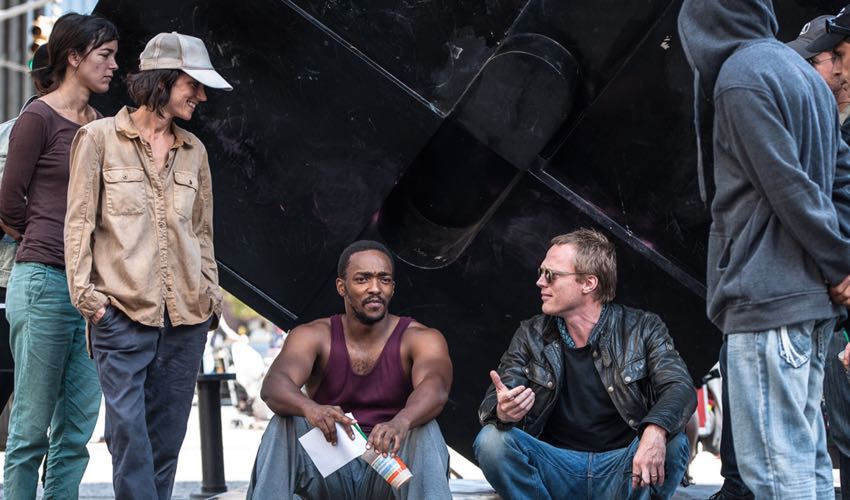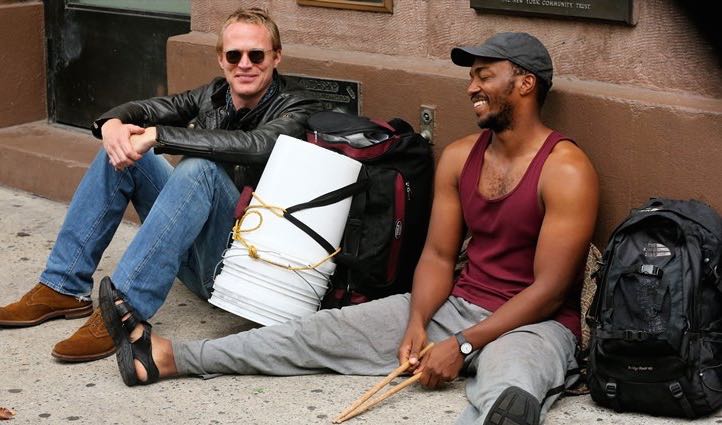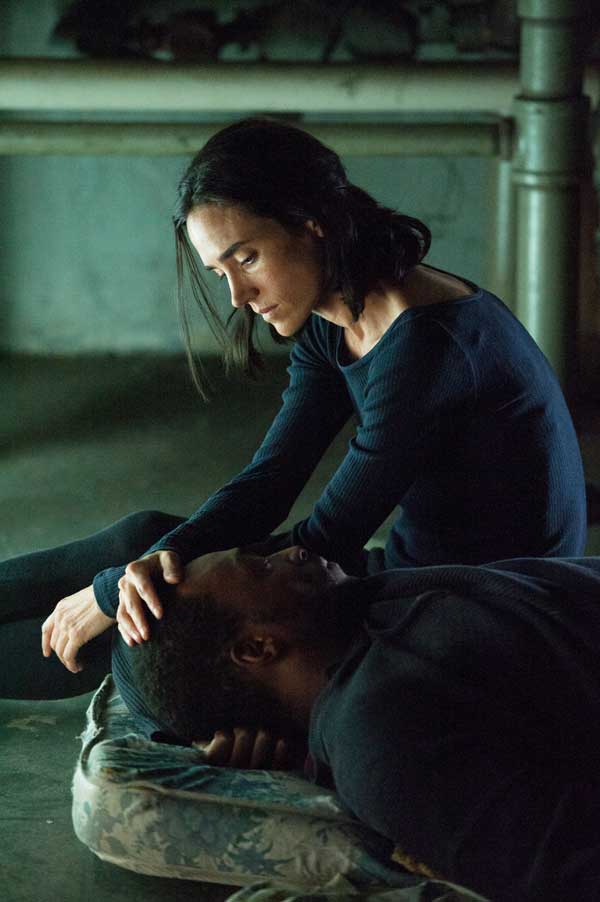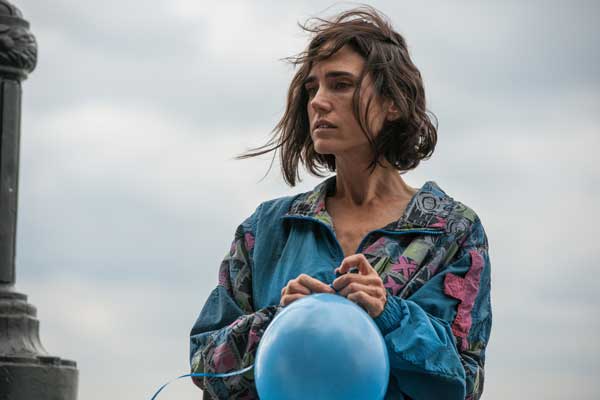Paul Bettany Talks Directorial Debut with Wife Jennifer Connelly and Anthony Mackie in 'Shelter'
- Details
- Category: Interviews
- Created: Monday, 16 November 2015 23:09
- Published: Tuesday, 17 November 2015 15:47
- Written by Justine Browning

Actor Paul Bettany’s first directing venture SHELTER, is a haunting story of struggle and reinvention. The film stars Bettany’s wife Jennifer Connelly as a homeless drug user still coping with the loss of her husband. When she meets an immigrant (Anthony Mackie) who is also living on the street and dealing with grief, the two form a crucial bond that inspires them both to pick up the pieces and pursue a more viable life.
At a recent press conference for the film, held at the Crosby Street Hotel, Bettany and the film’s stars spoke about how the drama affected them personally, their personal view on the rising number of homeless in NY and their intense preparation for the project.
What did you find was the biggest challenge of directing?
Paul Bettany: For me pre-production was the worst part of this, it was the only bit that I had absolutely no experience with and it seemed to consist of people just telling me what I could and couldn't do, what we couldn't afford to do. It was just awful and depressing and then Paola showed up and it became about we could do and that was just wonderful. The design, I had just walked into a deli and I was passing a homeless guy and I put my hand in my pocket and I pulled out a note. It was a 20 dollar note and I gave him the note and he was blessing me and 'Jesus' and his luckiest day and I walk in and get a pint of milk. I walk out and he hits me up for some more money! I went, 'What are you doing? I just gave you the 20. He said, 'That was you!' I went, 'That was me. I thought, 'Of course, my hand might have been in focus and the note was in focus but I just wasn't in focus for him so we tried to design a sort of, a really small horizon at the beginning of the movie where people were out of focus unless they were Anthony or Jennifer panhandling the guy giving the cigarette- the cigarette and the hand are in focus but they're out of focus- and then we broaden out when they get respite in the Goldilocks Act when they find an apartment and their horizons start to broaden out. The idea in fact was that by Act 3 we would be shooting really wide. We lost our hiatus- we were going to shoot it with a hiatus but the schedule changed and the consequence was that we had to shoot the winter in summer- 90 degree heat- and add all the snow and I defy anyone in New York city to find a street in New York city without a fucking tree in it. There is so much green. So then I was close and tight again which was for me a compromise because we'd really designed this thing that opened out the film and became quite operatic at the end along with the language that became more operatic was the idea. So it ended up we had to a make slight compromise there but she was wonderful.
Did you set out to get a particular message across?
Bettany: When I started writing the film it wasn't about homelessness. It was about judgement. I feel like the world I live in- and we've talked about this a lot- the world that we live in seems to be full of increasing grey area and yet the culture that I live in seems to be getting really entrenched in black and white positions and I think it's urgent to talk about it because that's going to kill us all. Before it was about homelessness, I wanted it to be about romance, I wanted it to be about two people who are on paper unforgivable and then make you forgive them because my experience of people is that they're eminently forgivable. It became a story about homelessness but the idea of the love story was already very well formed in my head.
For Jennifer and Anthony, how did you prepare for your scenes? There are a lot of physical moments.
Jennifer Connelly: We rehearsed a lot actually. For our shooting schedule, we had a significant amount of time proportionally to rehearse and the every day we rehearsed as well so before the shooting commenced we had a rehearsal period and in some instances we were able to go to the locations, for example the apartment we were in we went to that practical location and rehearsed all the scenes in there and went through blocking options and that sort of thing which was really helpful. But all of the scenes we rehearsed, some of them we just ran in and did like the end scene for example when my character is drunk and high and dancing, we just jumped in and did. Most of the scenes, I think we had time to run through before we filmed.
Anthony Mackie: Jennifer is very small so I'm glad she was tiny.
Paul, how did meeting homeless people inspire your writing?
Bettany: About the same time that I was wanting to make a film about judgement, Hurricane Sandy hit New York City. It was at that point I remembered, we have a very similar story, him [Mackie] after Hurricane Katrina. I live in a really nice apartment that I moan about because now I'm a New Yorker. If you live here for 15 years and you're overcaffeinated and shouting at cab drivers with everybody else. Outside my apartment was this homeless couple, a black man and a white woman, she was blonde and I would see them every day. We would pass them on the school run, my children would say hello to them, they would say hello to us and that was kind of the extent of it. I'm ashamed to say that day by day their poverty became more and more acceptable to me and they became invisible before they actually disappeared. Then Hurricane Sandy hit and I never saw them again and we were in this mandatory evacuation of our area of Tribeca and they used to live in a tiny little piece of a park, it's laughably small- smaller than this room- corner of Canal Street and West Side Highway. They used to live under a plastic tarpaulin and I noticed that they seem to complain less about their circumstances than I did and I admired that and then I really couldn't see them anymore and I felt the instinct to write about them but I didn't know who they were. Then I thought wait a second maybe that would be a really good way to discuss judgement because I find our response to homelessness really puzzling.

Did working with Paul, inspire you to want to direct at some point?
Mackie: I've thought about it but there are so many good directors, it wouldn't make sense for me to be a mediocre director. I might as well go work with good directors. It's funny because with this project, I was becoming fed up and frustrated with the business and I went to LA to see a friend. It was my first time going to LA and outside his window was Skid Row. I was like, 'Oh My God! What is this? I just started reading up on it and learning about it, and I called my reps, maybe a short or a character study or maybe I'll direct it but I have to write it. So I was just going over it and researching and trying to learn what it would be. A few months later Shelter comes across. It was like Kismet. It was fate. I just thought it was ironic and funny that seeing that made me want to create something and out of that want to create, Paul gave me a gift.
You’ve both been in big budget special effects films, did you feel naked doing this movie?
Mackie: There was no craft service. Anyone who knows me knows craft service keeps me happy! I want my cookies, my doughnuts I cut up and eat throughout the course of the day. Swedish Fish- that's what I do. No, it's a give and take. I've done a few movies like this- I feel like some of my most successful movies like my first movie was like this: The 20 to 25 day truncated shoot and it's interesting. It makes you appreciate the big budget movies and all that stuff but doing the big budget movies really makes you appreciate doing movies like this. Because this is like doing theatre. It's not all the other stuff that goes into it- you've just got to hit the ground running. So, no I feel like they go hand in hand.
 Connelly: As an actor it was an amazing experience. I felt exposed but in a good way like I was able to be for it to..I felt supported enough to make myself, to expose things that I hadn't before maybe. Literally and more figuratively, I guess. That was for a number of reasons. The sort of film it was. The kind of film Paul wanted to make.The kinds of performances he was interested in. The space and trust that he gave us as actors, the responsibility he gave as actors because a lot of times in other kinds of films- don't get me wrong,I love, they're just different kinds of creatures- everything is much more managed and decided on by committee. An actor has less responsibility and less space.Sometimes you come onto a set and there are tape marks on the floor where they want you to stand and everyone has decided on the dialogue and if you want to make a change or contribute something, it has to be approved by a number of people.This is a very different kind of project where everything was up for grabs really. I'm not just saying it was improvised but it was certainly open to collaboration in terms of interpretation and where we moved and how we interpreted what was on the page. It was a really wonderful experience and also having both the knowledge that Paul and I have. We are very creatively aligned, we like similar films, we like similar performances and also that i have obviously so much trust in him. I felt that I was able to experiment and play and try things and it was a very fulfilling experience for me.
Connelly: As an actor it was an amazing experience. I felt exposed but in a good way like I was able to be for it to..I felt supported enough to make myself, to expose things that I hadn't before maybe. Literally and more figuratively, I guess. That was for a number of reasons. The sort of film it was. The kind of film Paul wanted to make.The kinds of performances he was interested in. The space and trust that he gave us as actors, the responsibility he gave as actors because a lot of times in other kinds of films- don't get me wrong,I love, they're just different kinds of creatures- everything is much more managed and decided on by committee. An actor has less responsibility and less space.Sometimes you come onto a set and there are tape marks on the floor where they want you to stand and everyone has decided on the dialogue and if you want to make a change or contribute something, it has to be approved by a number of people.This is a very different kind of project where everything was up for grabs really. I'm not just saying it was improvised but it was certainly open to collaboration in terms of interpretation and where we moved and how we interpreted what was on the page. It was a really wonderful experience and also having both the knowledge that Paul and I have. We are very creatively aligned, we like similar films, we like similar performances and also that i have obviously so much trust in him. I felt that I was able to experiment and play and try things and it was a very fulfilling experience for me.
Bettany: I think it was a very naked experience for them. I absolutely- just to add to what Jennifer said. Sometimes more and more often as an actor, you'll walk out on set and you'll find your marks, the pieces of colour tape that are put on the ground to help the cameraman focus the camera there and so you realize that somebody else has worked out where you're going to move in the scene. Which is peculiar because then you find yourself genuinely as an actor going, 'I wonder what my job actually is?' Because right now it seems that my job is to make this dialogue sound believable or natural or invest it with some sort of vague emotion to make it seem real.I feel like I'm capable of a little bit more than that, maybe taking part in the actual storytelling rather than you've got it figured out- then what I am doing here? I think it is exposing because I wanted to know as the director, 'How do you want to tell this story? What do you think?' Often we would rehearse and they would get up and they would play and it would be so different from what I had in mind that I would sit with myself quietly and think, 'Does my story survive that interpretation? If I thought it did, I'd shoot it. I don't want to infantilize the actor, I want to empower the actor. Actors can be many things- venal, vain, I'm both self-serving, self-obsessed but all of the really good ones are really great storytellers. I'm interested in that. If you're not interested in that as a director, you better me Stanley Fucking Kubrick. Right every time if you're not going to see what these other human beings that you've invited into this creative process are interested in doing themselves. They are the sort of movies I like and I would argue that films like Five Easy Pieces are extraordinary because Jack Nicholson is extraordinary in the moment in front of the camera and it wasn't all nailed down in some ghastly script process that squeezes the life out of the actor.
How did you go about constructing the backstory for these characters?
Connelly: I felt like the way the film was constructed, these two characters meet and they fall in love and then they learn about each other and things are very important pieces. It becomes revealed that they each embody things that they always love that they hated and they couldn't tolerate. In Hannah's case he represented exactly what took away the man that she loved. He was a terrorist. So then the challenge became how do they reconcile that and can they still love each other despite that new understanding and can they forgive one another? So I thought that was
the heart of the story, learning at that point the backstory.
Mackie: For me it was very important because I realized that this story is all about family and family loss and how it influences your day-to-day life. I met this one guy near my place and he was telling me how he had recently become homeless because of a fire. He lived in an apartment, his apartment caught fire, he didn't have renters insurance and he just didn't know where to pick up next. I thought that was so interesting. He didn't have a family member he could go to, he didn't have a second person he felt like he could stay with or someone he could borrow clothes from or anything. He just couldn't figure what the next step was so then he lost his job. The emotional aspect of losing his baby pictures and everything just destroyed him like he didn't exist any more, he had no history. So when I read the script, I loved the idea of seeing the idea of finding his peace, finding his ticket to heaven through her.
Bettany: I was always interested when the audience met the two characters and when they found out what their histories are. So you as the audience meet some people, you kind of begin to like them, you see they're falling in love, you're kind of wishing them well and then you learn these awful things about their past and then they make you forgive again because it's urgent. There's a lot of forgiveness needed in the world.and we're all so quick to judge, I think.
Did you reach out to any of the amazing directors you’ve worked with - Peter Weir, Ron Howard, Joss Whedon?
Bettany: No I didn't but they were the biggest resource for me in showing them early cuts of the movie. Ron Howard, Darren Aronofsky, David Koepp, Joss Whedon, Johnny Depp, lots of people that I know and not just directors. Just loads of people that I've worked with and trust who I really admire. But I did that afterward. I really kept my eyes open. As an actor you see it when you meet a young actor on the first day of set, you can see whether they're going to be the sort of actor who is going to bullshit that they know what they're doing or ask loads of questions.
I was really inquisitive and wanted to know, 'Hey, what does that do?' I was that sort of actor when I was them at that age. So I've been watching and one of the things that I really notice with the great directors - actually I first saw this and recognized it in Peter Weir- is he knows who is telling the story. Whether it is the actors holding the responsibility or whether it's the camera crew holding the responsibility. If it's the actor holding the responsibility every take is the actors and by that I mean there is no complicated technocrane move that is going to move in on you during your speech and come in and catch a tear rolling down your cheek and eight out of ten of them are out of focus. All of those takes are for the crew because there's this complicated camera. Every scene that is held by the actors is just simple camerawork, nothing could be out of focus, every take going to you the actor, just generous, every take. When it's the camera crew, you better be on your fucking mark because they're the ones telling the story, they're the ones responsible for it;. So I've thought about that a lot and tried to figure out who was the most important… is me
What was the most important thing that you learned about yourself while making this film and what are your thoughts on Bill Bratton saying that the way to deal with homeless people asking for money is to ignore them?
Mackie: I'm not going to get myself in trouble because this is a grenade question. I think for me, the interesting thing was I learned so much about myself, reading this script and doing this movie because I was that person. The level of judgement and the lack of humanity I saw in myself was disgusting. Every time I'd walk past a homeless person. I'd be like, "Get up! Get a job! Get off drugs!" I never took into account what that person had been through, what happened to get that person to that place. It really blew my mind, learning what I learned about homeless shelters and just the idea of finding a warm place to sleep at night, it reminded me of the prison system and the idea,or lack thereof, of rehabilitation in the prison system. Just trying to get a good night's sleep within incarceration. It was just troubling and eye-opening and I never really took into account the number of families. When I was a kid, we used to do this Feeding the Hungry program at my church every other Saturday and it blew my mind one day when I was scooping out food and this kid from my school was there. I was like, 'shibbitigibbett, that dude and I go to school together. Somewhere between that moment of realization and appreciation for what my dad sacrificed for us to have and me becoming Anthony Mackie, I lost it. This movie really made me realize that and it was humbling and very sickening to see that within yourself so now I make my kids go and scoop chicken on the weekends. If they don't do the right thing, I take their shit from them and give it to other kids.

Connelly: I don't think ignoring problems is ever really the solution, I think that's what we have been doing in creating an invisible group of people that we're not supposed to think about or look at. It isn't true. There is no group of people that isn't entitled to the same basic human rights as the rest of us.
We're all entitled to the same human rights. There's an amazing organization that we worked with, the Coalition for the Homeless, they helped Paul when he was writing the script.I spent a bunch of time with them when I started doing research for the film and a wonderful group of people here in New York, It's an incredible organization and for people who do want to get involved and do something about it, that's a great place to start.; In terms of if you want to get involved financially or with your time, there are a number of ways so that's a great resource. In terms of what I learned about myself, it's so hard to keep perspective and keep things in context and it's so easy to get distracted and start striving for...it's easy to lose context and it's really important and it reminded me how important it is to strive, to remain aware and to keep seeing those people and to keep seeing what is happening around the world and to be conscious of how blessed we are to worry about the silly things that we worry about most of the time when people are worrying about where they are going to sleep and how they are going to feed their kids and will they make it through the day. That's important to think about,
Bettany: I am not one to say anything rude about anyone else but that's a fucking stupid idea to ignore the homeless, especially when there's 60,000 of them on the streets staying in shelters in a city that's home to more billionaires than any other city on earth. An apartment sold for a hundred million dollars in New York city, a city I love and have lived in for fifteen years. In that same year 60,000 people slept in the shelter system every night. 24,000 of them will be children. 19,000 of them are women. Half of New York City's homeless population are families. In the last 10 to 15 years, this town has lost 32 per cent of its public housing. You'd be a fool and a communist to draw a line between losing 32 per cent of public housing and 60,000 homeless people seeking shelter every night.
SHELTER is playing in select movie theaters.